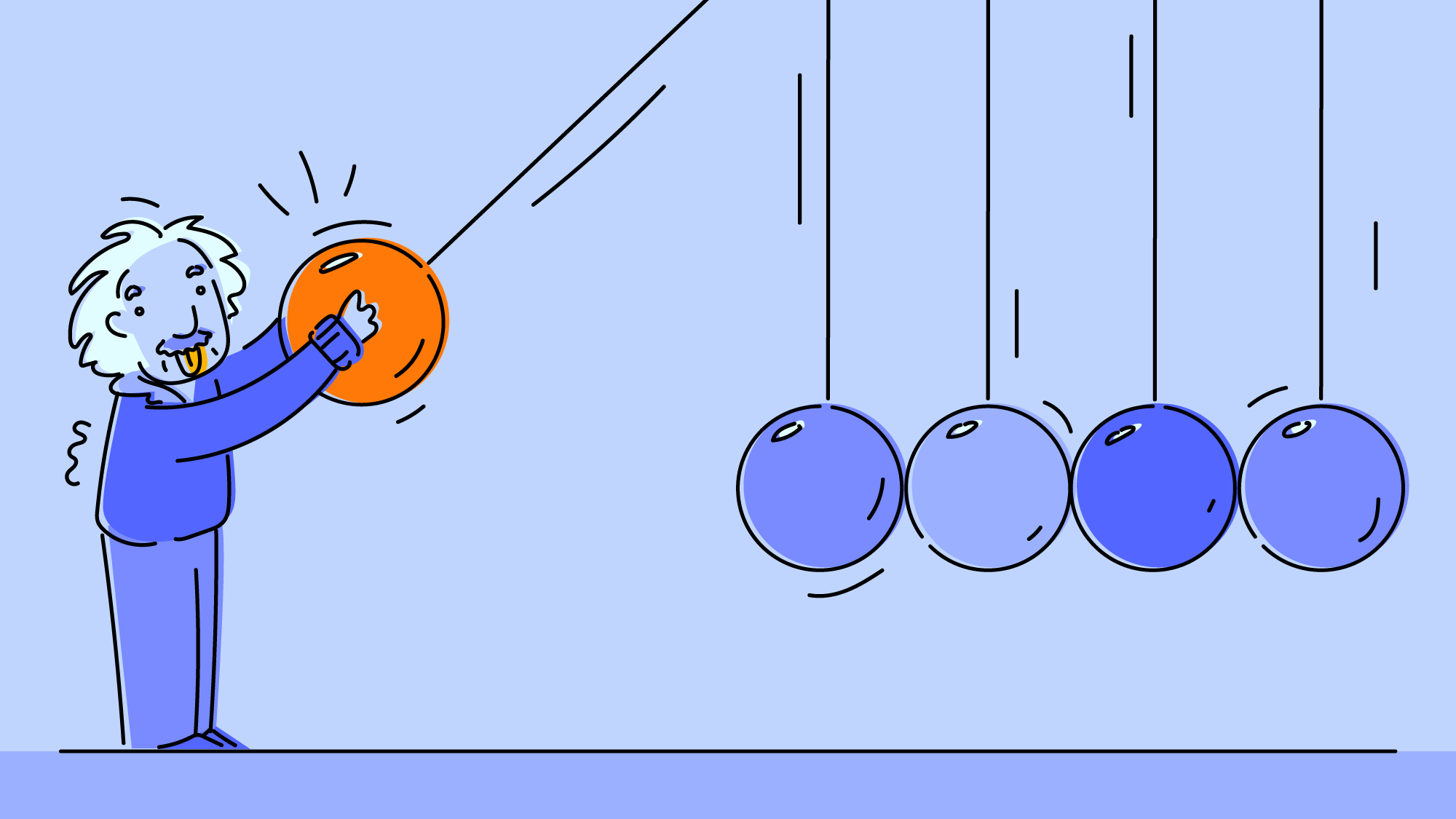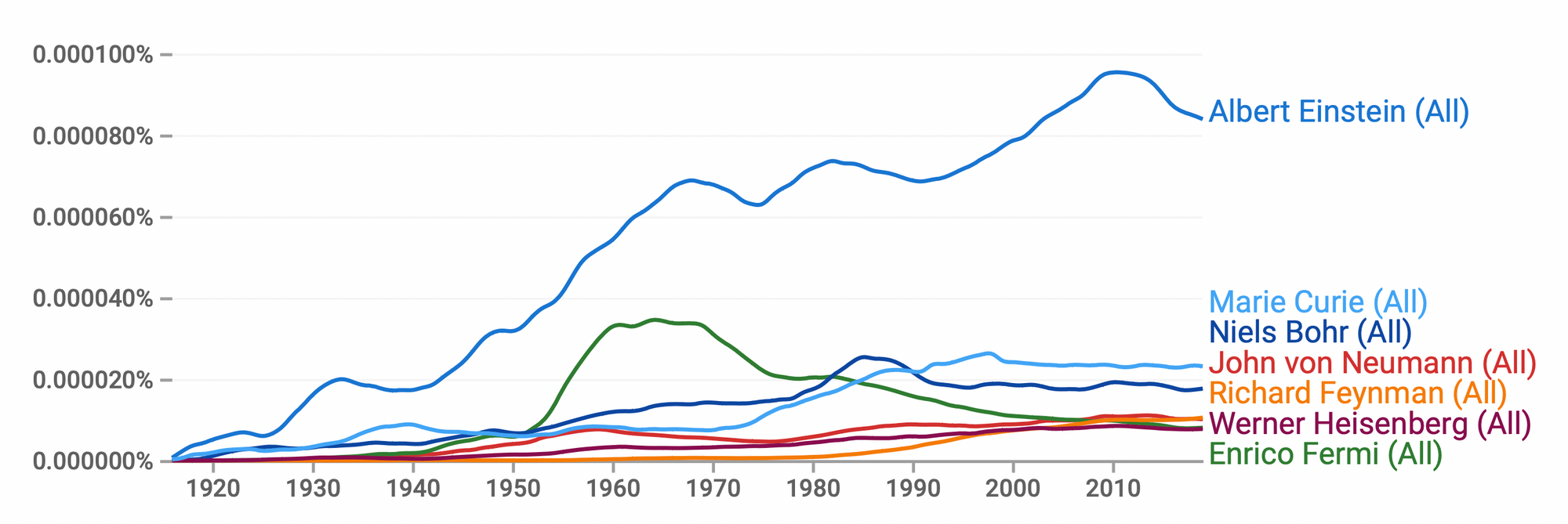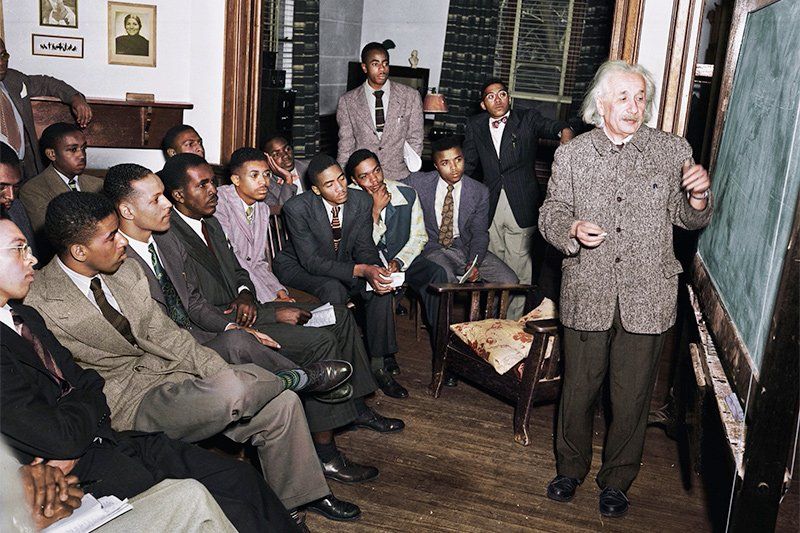We Picked Right with Einstein

This post is part of a series on people. Previously: The best predictor ever, and the greatest rags-to-riches of the 21C.
“Einstein”
The name has become uniquely synonymous with intelligence: products like “little Einstein”, memes of “that student’s name? Albert Einstein” and selection as Time’s Person of the Century have cemented him into the popular culture as the prototypical genius.
Is this right though? The world needs an intellectual hero, but was Einstein really the smartest person ever?
Extreme outliers are inherently hard to quantify, and there is plenty of debate around this. For example, I’ve noticed that the connoisseur’s favorite is usually John Von Neumann (see this enormous list of stuff named after him).
Even if Einstein wasn’t strictly the smartest, could he at least be crowned the most influential scientist of the 20th century? Again, views differ; from the perspective of the Nobel Committee, it’s probably Marie Curie.
However, while Einstein’s position as the “smartest person ever” or “most influential modern scientist” is debatable, his position as the cultural archetype of “really smart person” is not. The fact is, if anyone can name just one scientist, it’s nearly always Einstein:

Humanity only had one spot for “famous genius”, and picked Einstein.
So how did we do?
I would say we couldn’t have done better.
I say this because we shouldn’t be the maximizing intelligence of our archetypal smart person, we should actually be maximizing their good character.
Why character instead of intelligence? For one, hardly any of us are in a position to meaningfully judge the intelligence of anyone that smart. We’d be judging their lofty thoughts with our middling thinking. It would be like a pet trying to figure out which of its similarly-smart owners is smarter.
Since we can’t tell the difference anyway, it doesn’t matter that we get the intelligence part precisely right. And even if we could discern between smarter and smartest, it’s not like we would be able to do anything with that information. Myths about Einstein failing math aside, all the “smart person” candidates were so obviously exceptional from a young age that most of us can be confident that we’ll never seriously emulate them intellectually. (Though you can still go start Amazon or whatever.)
However, it’s character where mere mortals can differentiate and imitate; a dog may not be able to judge human intellect, but they can actually make judgments of character.
Not only can we tell which “smart person” acted better or worse, but we can put the lessons from their good example into practice! Most of us will rarely make any decisions of serious intellectual importance, but we’re constantly making impactful ethical decisions, like what to buy, where to work, and how to vote.
This is doubly important for those in power: would you rather Xi Jinping’s intellectual hero be the committed desegregationist and pacifist, Albert Einstein, or the German nationalist and Nazi nuclear program leader, Werner Heisenberg? Do their respective scientific merits even matter here?

Einstein looks remarkable even when compared to his more typical contemporaries. During the Manhattan Project, his pacifist leanings were considered a security risk, so he was excluded, unlike practically every other eminent physicist in the country.
Though he did sign the Einstein–Szilárd letter urging President Roosevelt to start an American nuclear weapons program, it was out of an understandable desire to beat Nazi Germany to the bomb. Later he remarked:
Had I known that the Germans would not succeed in developing an atomic bomb, I would have done nothing.
No disrespect to any scientist who worked on nuclear weapons during World War II, but I do have to note that Einstein looks unusually good in this regard.[1] Add this to his early opposition to the oppression of African-Americans (starting no later than 1931),[2] and he seems like a clear moral standout.
Ultimately, our “smart person” role model should really be the most moral person we can find that’s at least passable as a “smart person”.
What we got, though, is a moral sage that’s passable as the most influential mind of all time.
We picked right.
Some attribute the development of nuclear weapons to Einstein because of his famous mass-energy equivalence (E=mc²). This is a fundamental law of physics, described 40 years before the bomb and only indirectly applicable to weapons. You might as well go and blame Rutherford for his model of the atom. ↩︎
Einstein’s diaries revealed views about nationalities that are today considered offensive. Honestly, by the standard of the time, the comments seem fairly tame and basically just consist of cultural stereotyping, which while now taboo, is still widespread. ↩︎
Thanks to Uri and Kaamya for feedback on drafts of this.